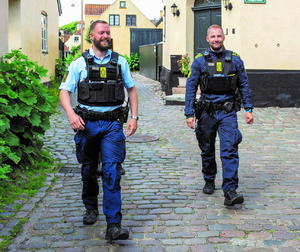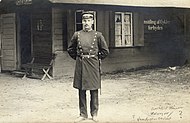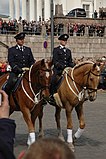Custodes Yonderre: Difference between revisions
m Text replacement - "Category:2022 Award winning pages" to "{{Template:Award winning article}} Category:2022 Award winning pages" |
Tag: 2017 source edit |
||
| (2 intermediate revisions by the same user not shown) | |||
| Line 153: | Line 153: | ||
==See also== | ==See also== | ||
* [[Crime in Yonderre]] | * [[Crime in Yonderre]] | ||
* [[Sociolance (Yonderre)]] | |||
* [[National Gendarmerie of Burgundie]] was developed in the 1870s followning the post-1833 reformed structure of the Custodes. | * [[National Gendarmerie of Burgundie]] was developed in the 1870s followning the post-1833 reformed structure of the Custodes. | ||
* [[Poaching in Yonderre]] | |||
* [[Erik Himmelreich]] | |||
[[Category:Yonderre]] | [[Category:Yonderre]] | ||
[[Category:Crime in Yonderre]] | |||
[[Category:Law Enforcement Agencies]] | [[Category:Law Enforcement Agencies]] | ||
[[Category:Canonical Article]] | [[Category:Canonical Article]] | ||
Latest revision as of 05:15, 24 June 2024
This article is a work-in-progress because it is incomplete and pending further input from an author. Note: The contents of this article are not considered canonical and may be inaccurate. Please comment on this article's talk page to share your input, comments and questions. |
| Custodes Yonderre | |
|---|---|
 Logo since 2012 | |
Emblem of the Custodes Yonderre | |
| Motto | Semper Vigilis Ever Vigilant |
| Agency overview | |
| Formed | 1643 |
| Jurisdictional structure | |
| National agency | Yonderre |
| Operations jurisdiction | Yonderre |
| General nature | |
| Operational structure | |
| Headquarters | Collinebourg |
| Police Officers | 174,256 |
| Civilian Employees | 53,423 |
| Agency executive |
|
The Custodes Yonderre is the national police force of the Serene Grand Duchy Yonderre. As of 2026, the Custodes Yonderre employs 227,697 people, of which 174,256 are sworn in as officers and 53,423 are civillian employees. Custodes are constitutionally empowered to enforce the law and to effect public and social order, as well as being responsible for border control. Officers of the Custodes Yonderre are referred to as "Custode" in Burgoignesc and "Kustode" in Gothic, and the Chief of Police is referred to as the "Supreme Custodian".
The Custodes Yonderre was first formed in 1643 in the immediate aftermath of the Yonderian Peasants' War. Custodes were initially focused around large cities to enforce law and order, while villages and outlying areas maintained their local watchmen and catchpoles for decades to come. The Custodes Yonderre was reformed in 1833, written into its more modern form as part of the Consitution of Yonderre. The Custodes Yonderre then replaced the previous local and county-based watchmen organisations and nationalized and standardized policing across Yonderre with the introduction of a common code of law across all Counties of Yonderre in 1836.
Custodes Yonderre also processes licenses and permits such as gun licenses, national ID cards and passports, and furthermore, enforces immigration decisions by the Yonderian Immigration Service. Local police must also be notified when organizing public events that may significantly influence local public security and traffic.
History
1643 Establishment
The Custodes Yonderre was established in 1643 immediately following the Yonderian Peasants' War. The events surrounding the Yonderian Peasants' War had made it very clear that the previous system of law and order in Yonderre consisting of local watchmen and catchpoles working in loose conjuction with the de facto standing army made up of the Knights of the Realm was an outdated and insufficient model of policing. The Custodes Yonderre were initially stood up in the major cities Collinebourg, Donnebourg, Gabion, Sainte-Catherine and Toubourg. Subordinated to the Stewards of the cities, the Custodes fell somewhere in between watchmen and soldiers and have been described by historians as a proto-paramilitary organisation. The Custodes of the period were required to follow the local laws and customs while maintaining law and order but were within their right to ajudicate and execute judgements over petty crimes. Examples include corporal punishment for theft, which may have been carried out summarily or in a more public setting to discourage others from theft.
1833 Constitutional reformation
- Custodes Yonderre
-
Custode, 1900
-
Depiction of Social Democrat unrest, 1900s
-
Custode with carbine conducting an investigation, 1942
-
Custode directing traffic, 1950s
Present day
- Modern Custodes Yonderre
-
Custodes in riot gear, left is armed with a grenade launcher for firing tear gas, 2007
-
Mounted Custodes in dress uniform in Sainte-Catherine, 2017
-
Custodes in Stonne, 2019
-
Mounted Custodes in Toubourg, 2022
Organization
Since reforms in 1971, the Custodes Yonderre has been organized into 125 districts. The districts vary in size and tasks based on the size of their geography and population. The largest district in terms of population is the Collinebourg Urban District which oversees more than 8.200.000 citizens, whereas the largest district by square kilometers is the Famichez district in Vandarcôte County.
Besides the regular districts other organizations exist that work outside the general Custodes Yonderre:
- Custodes of the Realm - a nationwide police force with specialized tasks such as Budgets and Accounts, Building Surveying Department and the Data Investigating Department
- Central Department of Intelligence - the national security intelligence agency of Yonderre
- Special Intervention Force - the special forces unit of the Custodes Yonderre, modelled on and trained by DELTA
- National Unit for Special Criminality - national crime unit that investigates and prosecutes organized, economical and cyber crime.
Equipment
Uniform

The standard service uniform of the Custodes Yonderre since 1995 has consisted of navy blue trousers, light blue short-sleeved shirts and black laced ankle boots. Depending on weather and personal preference, navy blue pullovers and shell jackets are available, as are navy blue baseball caps. Neck ties (clip-on to prevent strangulation) are issued but not required to be worn and seldom used. Bullet resistant vests were made compulsory for patrol officers in 2005 over concerns of terrorism and increased levels of firearms usage by gangs, initially as NIJ Type II-rated soft armour vests and beginning in 2013 as NIJ Type III-rated plate carriers.
The dress uniform of the Custodes Yonderre is an all-black uniform with leather jackboots, garbadine trousers and tunics and peaked caps. Woolen coats may also be worn depending on weather. The dress uniform is intended to evoke the uniforms of the Custodes Yonderre of the mid-nineteenth century.
Vehicles
The Custodes Yonderre have at their disposal a wide variety of motorized vehicles ranging from Rhea Automobili motorcycles to military utility vehicles like the Kossaque and even Mine-Resistant Ambush Protected vehicles. Among the standard police cruisers of the Custodes Yonderre are the Cross Trucking Company Charger and Hermès Auto Equalizer, both used for general policing across all 125 districts of the Custodes Yonderre together with native cruisers like the AMG Intrepid and FS K500.
Tools and weapons
The standard service pistol of the Custodes Yonderre is the MAG-81, being supplanted by the MAG-17CY since the mid-2020s. Custodes also have access to Urcean SMPM-4 submachine guns and FAMAG assault rifles, one of each of which is carried in patrol cruisers in case of emergency. Custodes carry capsaicin-based pepper sprays and rubber-coated steel batons as less-than-lethal instruments. The Custodes Yonderre tested but decided against using tasers after pre-field evaluations found them unreliable in 2012. Custodes on patrol carry both steel handcuffs and zip ties to restrain people. All Custodes carry personal first aid kits as part of the patrol uniform, and larger first aid kids are carried in patrol vehicles with contents ranging from bandaids and antihistamines to tourniquets and packing bandages. As per the Custodian Act of 2015 §7c, all motorized vehicles of the Custodes Yonderre used for policing carry fire extinguishers.
Mission statement
Apart from the powers vested in them by the Constitution of Yonderre, the Custodes Yonderre are governed by the Custodian Act of 2015. Its first section states that "[t]he Custodes must work to ensure security, safety, peace and order in society. The Custodes must promote this purpose through prevention, assistance and enforcement." The second section states that other areas of Custodes jurisdiction include:
- preventing criminal actions, disturbances of the public peace and order and danger to individual citizens and public safety
- stopping criminal actions and investigating and prosecuting criminal actions
- supporting citizens in dangerous situations
- carrying out checking and inspecting under current rules and regulations
- supporting other agencies under current rules and regulations
- performing other tasks under current rules and regulations, as well as handling other tasks which are naturally associated with police duties.
Lastly, the third section states: "The Custodes may in other situations than those mentioned in statutory law only interfere with citizens under this Act."
See also
- Crime in Yonderre
- Sociolance (Yonderre)
- National Gendarmerie of Burgundie was developed in the 1870s followning the post-1833 reformed structure of the Custodes.
- Poaching in Yonderre
- Erik Himmelreich







